X-linked transcriptome dysregulation across immune cells in systemic lupus erythematosus

Systemic lupus erythematosus (SLE) is an autoimmune disease which affects far more women than men. Differences in how the X chromosome is regulated may help explain this imbalance. In this study, we analyzed the gene expression of 27 types of immune cells from 125 women with SLE and 66 healthy women. We focused on X chromosome genes and found that cells from the adaptive immune system - such as T cells, B cells and plasmablasts - showed increased expression of the genes in the X chromosome in SLE. In contrast, cells from the innate immune system, like monocytes and dendritic cells, showed decreased expression. Additionally, we used computational models to identify gene expression patterns that could distinguish SLE patients from healthy individuals. In doing so, we identified several disease-associated markers that could help better describe SLE. A key gene called XIST, which is a major player in the regulation of X chromosome expression, was consistently less expressed in several cell types, especially monocytes and Th1 cells. This reduction was associated with an increase in the expression of SLE-related genes and immune signalling pathways. Other genes that interact with XIST were also found to be disrupted in SLE. These findings highlight the differences in the regulation of the X chromosome in different cell types and give insights into the regulation of the X chromosome in SLE female patients (Soares et al, 2025).
